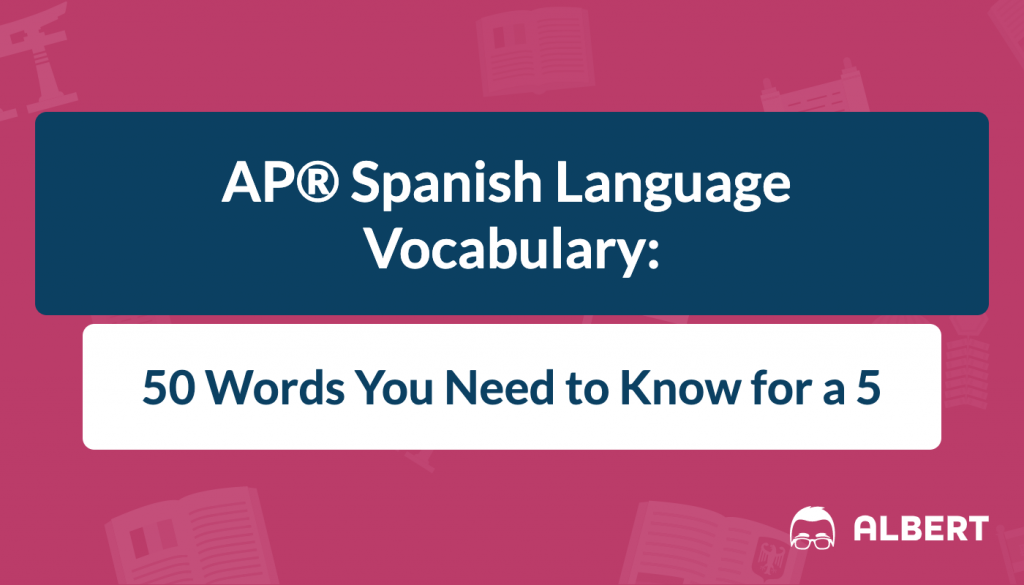AP® Spanish Vocab
By the time you are sitting down to take the AP® Spanish Language and Culture exam in May, you will likely have taken anywhere from two to five years of Spanish classes. Throughout those years, you have learned countless vocabulary words, from the basics of describing yourself to the various food groups and even travel words. Naturally, it is difficult to determine which words are important to know for the exam. Here’s a list of 50 AP® Spanish vocabulary words to add to your repertoire to push you one step closer to a 5! Each word is followed by a short example showing how it is used in a natural context.
Transition Words
One of the most daunting aspects of the exam are the two written tasks, but these transition words can be used to strengthen your essays and are a great addition to an AP® Spanish vocabulary list.
1. No obstante – nevertheless
- Hay mucha nieve afuera. No obstante, hace calor por dentro.
- There is a lot of snow outside. Nevertheless, it is warm inside.
2. Por lo tanto – therefore
- Quiero obtener un 5 en mi examen de AP® Spanish. Por lo tanto voy a estudiar todos los días.
- I want to get a 5 on my AP® Spanish exam. Therefore, I will study every day.
3. Desarrollar – to develop
- Planeo desarrollar tres puntos.
- I plan to develop three points.
4. De hecho – in fact
- De hecho, hay muchos cambios en nuestra tecnología.
- In fact, there are a lot of changes in our technology.
5. En cambio – in contrast
- Yo, en cambio, preferiría un gato, no un perro.
- I, in contrast, would prefer a cat, not a dog.
6. En realidad – actually
- En realidad, los cambios no son tan mal.
- In reality, the changes are not that bad.
7. Además – moreover
- Este cuadro tiene muy colores y además es muy expresivo.
- This painting has a lot of colors and moreover is very expressive.
8. En pocas palabras – in short / in a few words
- Quiero contarte la historia en pocas palabras.
- I want to tell you the story in a few words.
9. Por otro lado – on the other hand
- Es una casa bonita. Por otro lado, está en una calle ruidosa.
- It’s a pretty house. On the other hand, it is on a loud street.
10. Por supuesto – of course
- Por supuesto es importante que estudiar.
- Of course it is important to study.
11. Por ejemplo – for example
- Hoy, por ejemplo, el clima está nublado.
- Today, for example, the weather is cloudy.
12. Ambos – both
- Ambos chicos quieren ser doctores.
- Both boys want to be doctors.
13. Igualmente – similarly
- Las dos soluciones son igualmente razonables.
- The two solutions are equally reasonable.
Theme Words
The AP® Spanish Language exam is centered around six main themes, and there are certain vocabulary words that are important to know for each.
Global Challenges
14. La natalidad – birthrate
- La natalidad no ha cambiado desde tres años.
- The birthrate has not changed for three years.
15. El pronóstico – forecast
- El pronóstico económico para España muestra crecimiento.
- The economic forecast for Spain shows growth.
16. La población – population
- Está estudiando la población de México.
- He is studying the population of Mexico.
17. El desafío – challenge
- El hambre es uno de los desafíos mundiales.
- Hunger is one of the global challenges.
18. Infraestructura – infrastructure
- Es importante que un país construya su infraestructura.
- It is important for a country to build its infrastructure.
Science and Technology
19. Predecir – to predict
- Es difícil predecir los cambios en la ciencia.
- It is difficult to predict changes in science.
20. La informática – computer science
- La informática es un campo en crecimiento.
- Computer science is a growing field.
21. El sitio – website
- El sitio tiene un diseño muy fácil de usar.
- The website has an easy-to-use design.
22. Los avances científicos – scientific advancements
- La salud ha sido ayudado por los avances científicos.
- Healthcare has been helped by scientific advancements.
23. El progreso – progress
- Eso será un verdadero progreso.
- That would be real progress.
Contemporary Life
24. El crimen – crime
- El crimen es un problema grave de las sociedades modernas.
- Crime is a serious problem in modern societies.
25. El desempleo – unemployment
- Los políticos quieren reducir el desempleo.
- Politicians want to reduce unemployment.
26. Trabajo comunitario – community work
- El grupo de estudiantes está haciendo trabajo comunitario.
- The group of students is doing community work.
27. La pobreza – poverty
- Algunas personas viven en absoluta pobreza.
- Some people live in absolute poverty.
Personal and Public Identities
28. La autoestima – self esteem
- Autoestima aplica no sólo a las mujeres, sino también a los hombres.
- Self esteem applies not only to women, but also to men.
29. Las creencias personales – personal beliefs
- A veces es difícil cambiar las creencias personales.
- Sometimes it is hard to change personal beliefs.
30. El filántropo – philanthropist
- Ella es un filántropo de los derechos humanos.
- She is a philanthropist for human rights.
31. El líder – leader
- El es un líder naturalmente.
- He is a natural leader.
32. La identidad étnica – ethnic identity
- Los mexicanos se preocupan mucho por su identidad étnica.
- Mexicans care a lot about their ethnic identity.
Families and Communities
33. Los valores – values
- No son solamente valores hispanos, son valores universales.
- They are not only Hispanic values, they are universal values.
34. El patrimonio – heritage
- Su patrimonio es muy importante para ella.
- Her heritage is important for her.
35. Las raíces – roots
- Echan raíces en su nuevo comunidad.
- They put down roots in their new community.
36. Portarse bien – behave well
- Los padres deben enseñar a sus hijos a portarse bien.
- Parents must teach their children to behave well.
Beauty and Aesthetics
37. La moda – style
- Cada persona necesita definir su propia moda.
- Every person needs to define their own style.
38. Agraciada – attractive
- Las personas en las revistas son agraciadas.
- The people in the magazines are attractive.
39. El tratamiento – treatment
- Algunas personas buscan tratamientos para el acné.
- Some people look for treatments for acne.
40. La armonía – harmony
- Necesito armonía en mi casa.
- I need harmony in my home.
41. El equilibrio – balance
- Esta pintura tiene un buen equilibrio de luz y oscuridad.
- This painting has a good balance of light and dark.
Power Verbs
Tired of using the same verbs every other sentence? Well, guess what? The exam graders are tired of reading the same words paper after paper. Put these verbs on your AP® Spanish vocabulary list to add richness and uniqueness to your writing and speaking.
42. Señalar – to point out
- Él señaló su nuevo corte de pelo.
- He pointed out her new haircut.
43. Adquirir – to acquire
- Su tienda adquirió varios libros nuevos.
- Her store acquired various new books.
44. Soler – to be accustomed to
- Yo solí al clima cálido.
- I got accustomed to the warm weather.
45. Merecer – to deserve
- Este logro merece atención especial.
- This accomplishment deserves special attention.
46. Perdurar – to remain
- Cultura rural y antigua perdura en partes de Perú.
- Ancient rural culture remains in parts of Peru.
47. Destacar – to stand out
- Es un hombre que destaca por su altura.
- He is a man who stands out because of his height.
48. Concordar – to agree
- Concuerdan con la mayoría de la lectura.
- They agree with most of the lecture.
49. Comprobar – to prove
- Es importante comprobar su punto en un ensayo.
- It is important to prove your point in an essay.
50. Ponderar – to analyze
- Él pondera la cuestión durante una hora.
- He analyzed the question for an hour.
This is, of course, by no means an extensive list of words to know, but knowing these words, as well as reviewing crucial culture and grammar points, can put you one step closer to getting the score you want on the AP® Spanish Language and Culture exam. Let us know: are there any other words you think are crucial to know?
Let’s put everything into practice. Try this AP® Spanish Language practice question:
Looking for more AP® Spanish Language practice?
Check out our other articles on AP® Spanish Language.
You can also find thousands of practice questions on Albert.io. Albert.io lets you customize your learning experience to target practice where you need the most help. We’ll give you challenging practice questions to help you achieve mastery of AP® Spanish Language.
Start practicing here.
Are you a teacher or administrator interested in boosting AP® Spanish Language student outcomes?
Learn more about our school licenses here.









